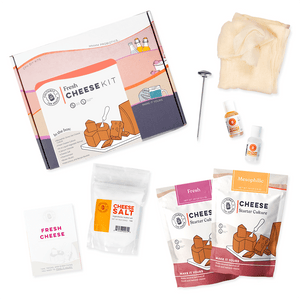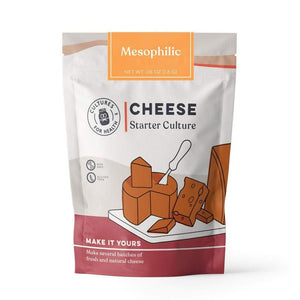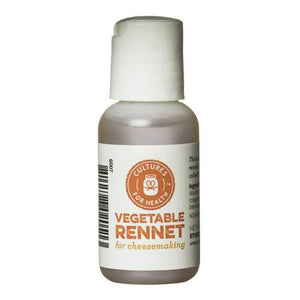
Queso fresco, meaningfresh cheese in Spanish, is a popular Latin American cheese and is present in many traditional Latin American dishes. It is much like queso blanco, being an easy, low-temperature cheese, but queso fresco is abit more work, for it is pressed and allowed to age slightly, thereby developing a more complex flavor than queso blanco.
15 minutes
35 minutes
2
INGREDIENTS AND EQUIPMENT AVAILABLE AT CULTURES FOR HEALTH
Fresh Cheese Making Kit

Fresh Cheese Making Kit
$45.99
Our most comprehensive choice, the Fresh Cheese Kit makes five varieties of soft cheese: feta, cottage cheese, cream cheese, fromage blanc, and traditional quark.
Packaging and Equipment in the kit may appear different than pictured.
Mesophilic Direct-Set Starter Culture

Mesophilic Direct-Set Starter Culture
$19.99
From cheddar, Colby, and Monterey Jack to Feta, Chevre, and more, you'll enjoy the flavor and variety of homemade cheeses made using this starter culture.
Liquid Vegetable Rennet

Liquid Vegetable Rennet
$7.99
Double-strength liquid vegetable rennet. Each bottle contains enough rennet to set (24) 2-gallon batches of cheese.
Cheese Salt

Queso fresco, meaning fresh cheese in Spanish, is a popular Latin American cheese and is present in many traditional Latin American dishes. It is much like queso blanco, being an easy, low-temperature cheese, but queso fresco is a bit more work, for it is pressed and allowed to age slightly, thereby developing a more complex flavor than queso blanco.
INGREDIENTS:
- 2 gallons whole milk
- 1 packet direct-set mesophilic culture
- 1/4 tsp. liquid rennet, dissolved in 1/4 cup cool water
- Cheese salt
INSTRUCTIONS:
- Heat the milk to 90°F.
- Add starter, stirring constantly with an up-and-down motion for 1 minute.
- Remove the milk from the heat and add the dissolved rennet, and incorporate with an up-and-down motion.
- Cover and let it set undisturbed for about 30 minutes, or until you have a clean break.
- Cut the curd into 1/4-inch cubes.
- Over medium-low heat, bring the temperature of the curds and whey to 95°F. Raise the heat gradually. It should take between 15 and 20 minutes. Keep stirring gently to prevent your curds from sticking together (matting).
- Once the curds have reached the proper temperature, let them set for 5 minutes, undisturbed, then drain off the whey.
- Add about 2 Tbsp. of cheese salt to the curds, then keep them at 95°F for 30 minutes.
- Line a cheese press with cheesecloth and put the warm curds into it. Press at 35 pounds of pressure for 5 to 6 hours.
- Remove the cheese from the mold and put it into a covered container in the refrigerator.
















